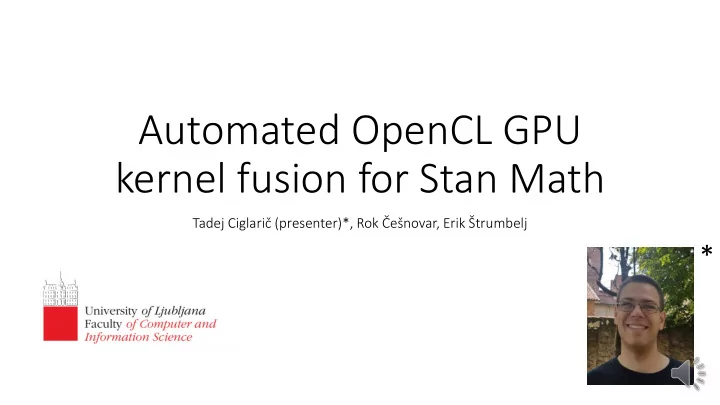

Automated OpenCL GPU kernel fusion for Stan Math Tadej Ciglarič (presenter) * , Rok Češnovar, Erik Štrumbelj *
Stan • State-of-the-art software for Bayesian statistics. • Probabilistic programming language + Math library with auto- differentiation + Inference algorithms. • Some operations have an OpenCL implementation.
Overview
GPU development in in the Stan Math li library ry • Hundreds of possible operations and distributions to implement for GPUs. • Sequence of basic kernels: simple to develop, poor performance. • Specialized kernels: good performance, slow development.
Kernel fu fusio ion • Execution of multiple operations in a single kernel. • Speedup: kernel launch overhead, memory transfers between registers and global memory. • Can be automated. • Data fusion. • Parallel fusion.
Im Implementation: : in interface Lazy evaluation: • Operations are C++ objects, • expression is evaluated when assigned to result matrix. Curiously Recurring Template Pattern: template <typename T_a, typename T_b> class addition_ : public binary_operation<addition_<T_a, T_b>, T_a, T_b> { public: addition_(T_a&& a, T_b&& b) : binary_operation<addition_<T_a, T_b>, T_a, T_b>( std::forward<T_a>(a), std::forward<T_b>(b), "+") {} }; template <typename T_a, typename T_b, typename = require_all_valid_expressions_t<T_a, T_b>> inline addition_<as_operation_cl_t<T_a>, as_operation_cl_t<T_b>> operator+(T_a&& a, T_b&& b) { return {as_operation_cl(std::forward<T_a>(a)), as_operation_cl(std::forward<T_b>(b))}; }
Implementation: Im : operation types Example: matrix_cl<double> a, b; double c; matrix_cl<double> d = c * (a + b); a + b addition_<load_<matrix_cl<double>&>, load_<matrix_cl<double>&>> c * (a + b) elewise_multiplication_<scalar_<double>, addition_<load_<matrix_cl<double>&>, load_<matrix_cl<double>&>>> Assignment of an expression to a matrix generates, compiles and executes a kernel.
Implementation: Im : generating kernel code Operation objects generate code for their operation: _ load : double [NAME] = 0; if (!((!contains_nonzero([NAME]_view, LOWER) && j < i) || (!contains_nonzero([NAME]_view, UPPER) && j > i))) { [NAME] = [NAME]_global[i + [NAME]_rows * j]; } _ addition: double var4 = var2 + var3; _load: var5_global[i + var5_rows * j] = var4;
Complete kernel kernel void calculate(__global double var1, __global double* var2_global, int var2_rows, int var2_view, __global double* var3_global, int var3_rows, int var3_view __global double* var6_global, int var6_rows, int var6_view){ int i = get_global_id(0); int j = get_global_id(1); double var2 = 0; if (!((!contains_nonzero(var2_view, LOWER) && j < i) || (!contains_nonzero(var2_view, UPPER) && j > i))) { var2 = var2_global[i + var2_rows * j]; } double var3 = 0; if (!((!contains_nonzero(var3_view, LOWER) && j < i) || (!contains_nonzero(var3_view, UPPER) && j > i))) { var3 = var3_global[i + var1_rows * j]; } double var4 = var2 + var3; double var5 = var1 * var4; var6_global[i + var6_rows * j] = var5; }
Adding a new operation • New class for the operation (derived from operation_cl or operation_cl_lhs ). • Must define: • Scalar , • generate , • view . • Optional: generate_lhs , rows , cols . • A function that constructs the object.
Empirical vali lidation • Comparison with a sequence of basic kernels. • Comparison with a hand crafted kernel. • Comparison with VexCL, a similar library. • On NVIDIA GeForce GTX 1070 and AMD Radeon VII.
Comparison wit ith a sequence of f basic ic kernels • Single operation kernel is comparable. • Sequence is much faster. • Matrix multiplication is slow, so speedups are negligible. • We also avoid memory reallocations, which are slow on NVIDIA GPU.
Comparison wit ith a hand craft fted kernel • On Bayesian linear regression. • Comparable performance. • Much simpler to use.
Comparison wit ith VexCL • Transposition and colwise sum are much faster. • Rowwise sum is slightly slower. • Other operations and multi- operation kernels are comparable. • Also supports general tensors and multiple OpenCL devices.
Conclusion • Performance is comparable to hand crafted kernels. • As simple to use as calling premade kernels. • Our work is similar to VexCL and Tensorflow XLA.
Recommend
More recommend